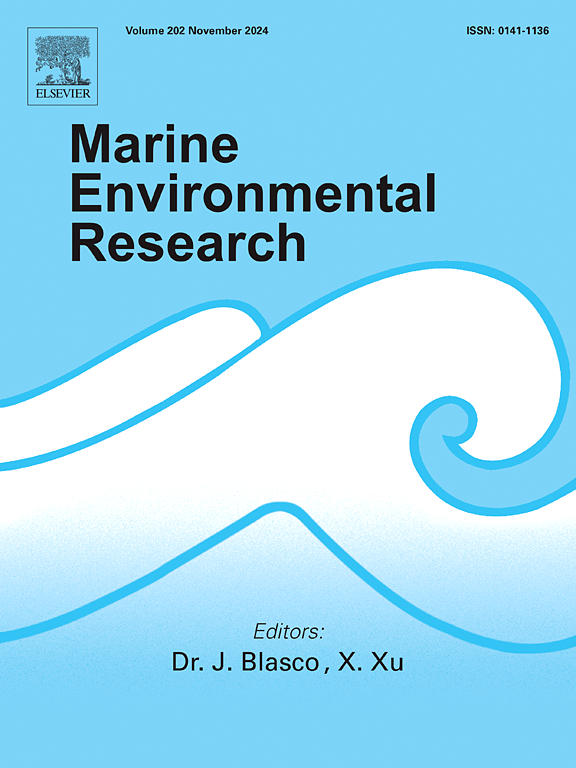Organic matter ingestion and assimilation rates by the sea cucumber Holothuria (Holothuria) tubulosa (Gmelin, 1788) at different temperatures and potential effects on benthic trophic status
IF 3
3区 环境科学与生态学
Q2 ENVIRONMENTAL SCIENCES
引用次数: 0
Abstract
We investigated the effects of different temperature anomalies (up to +12 °C) on the biochemical features of sediments offered to specimens of the sea cucumber Holothuria (Holothuria) tubulosa (Gmelin, 1788) and of its feces. We also estimated ingestion and assimilation rates of different classes of organic compounds after the different treatments. The exposure to temperature anomalies influenced the metabolism and organic matter assimilation efficiency of H. tubulosa. Counterintuitively, our results would suggest that H. tubulosa, irrespectively of temperature, might not be the best option for removing excess organic matter from eutrophicated sediments, though having consequences on the organic matter nutritional quality. Since oceans’ temperature is projected to further increase by 2100 along with frequency, intensity and duration of marine heatwaves, H. tubulosa will most likely experience a potential contraction of its distribution areal, with cascading consequences on benthic trophic webs dynamics.
海参Holothuria (Holothuria) tubulosa (Gmelin, 1788)在不同温度下的有机物摄取和同化率以及对底栖生物营养状况的潜在影响。
我们研究了不同温度异常(最高+12 °C)对海参Holothuria (Holothuria) tubulosa (Gmelin, 1788)标本的沉积物及其粪便的生化特征的影响。我们还估算了不同处理后不同类别有机化合物的摄取率和同化率。温度异常会影响管水母的新陈代谢和有机物同化效率。与直觉相反的是,我们的研究结果表明,与温度无关,管水母可能不是从富营养化沉积物中去除过量有机物的最佳选择,但会对有机物的营养质量产生影响。预计到 2100 年,随着海洋热浪的频率、强度和持续时间的增加,海洋温度将进一步升高,因此管水母的分布区域很可能会缩小,从而对底栖生物营养网的动态产生连带影响。
本文章由计算机程序翻译,如有差异,请以英文原文为准。
求助全文
约1分钟内获得全文
求助全文
来源期刊

Marine environmental research
环境科学-毒理学
CiteScore
5.90
自引率
3.00%
发文量
217
审稿时长
46 days
期刊介绍:
Marine Environmental Research publishes original research papers on chemical, physical, and biological interactions in the oceans and coastal waters. The journal serves as a forum for new information on biology, chemistry, and toxicology and syntheses that advance understanding of marine environmental processes.
Submission of multidisciplinary studies is encouraged. Studies that utilize experimental approaches to clarify the roles of anthropogenic and natural causes of changes in marine ecosystems are especially welcome, as are those studies that represent new developments of a theoretical or conceptual aspect of marine science. All papers published in this journal are reviewed by qualified peers prior to acceptance and publication. Examples of topics considered to be appropriate for the journal include, but are not limited to, the following:
– The extent, persistence, and consequences of change and the recovery from such change in natural marine systems
– The biochemical, physiological, and ecological consequences of contaminants to marine organisms and ecosystems
– The biogeochemistry of naturally occurring and anthropogenic substances
– Models that describe and predict the above processes
– Monitoring studies, to the extent that their results provide new information on functional processes
– Methodological papers describing improved quantitative techniques for the marine sciences.
 求助内容:
求助内容: 应助结果提醒方式:
应助结果提醒方式:


